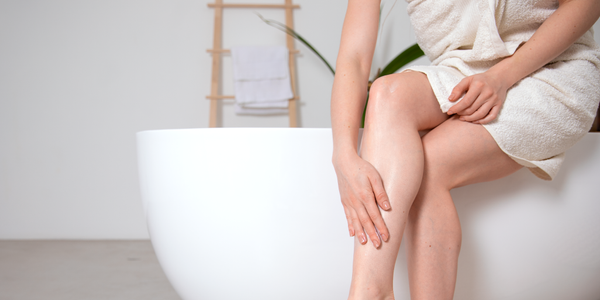Sleep Peacefully Again! Find Out How to Tame Those Restless Legs

Does it happen to you that you sleep, but don't rest? Do you feel that annoying urge to move your legs when you go to bed? If you feel identified, you are not alone. Restless Legs Syndrome (RLS) is a reality for millions of people around the world.
Restless Legs Syndrome (RLS), also known as Willis-Ekbom disease (WED), is a sensory-motor disorder that affects between 5% and 10% of the world's population. It is estimated that around 12 million people in Europe and the United States live with this syndrome, which can have a significant impact on quality of life.
RLS is characterized by discomfort in the lower extremities that is particularly active during periods of rest and at night. The associated sensations, such as tingling, discomfort, and discomfort, are difficult to describe, and are only temporarily relieved by sudden movements. People with RLS do not usually describe the condition as a muscle cramp or numbness, but rather often describe it as an intense desire to move their legs.
What Causes Restless Legs Syndrome?
Some neurologists (specialists in treating conditions that affect the nervous system) believe that the symptoms of restless legs syndrome may have something to do with the way the body handles a chemical called dopamine.
Dopamine is involved in the control of muscle movement and may be responsible for the involuntary leg movements associated with restless legs syndrome.
In some cases, restless legs syndrome is caused by an underlying health condition, such as iron deficiency anemia or kidney failure.
There is also a link between restless legs syndrome and pregnancy. About one in five pregnant women may experience symptoms in the last three months of their pregnancy, although it is not clear exactly why.
Fortunately in these cases, restless legs syndrome usually disappears once the woman has given birth.
The difficulty in explaining the symptoms further accentuates this feeling of incomprehension. This reason, together with prolonged lack of sleep, makes people with RLS more likely to suffer from depression, anxiety or emotional problems that can affect their family, social and, above all, work life.
What to do to treat this syndrome?
Mild cases of restless legs syndrome that are not related to an underlying health condition may not require any treatment, other than making some changes to your habits and lifestyle.
Here are some practical suggestions that might help you relieve RLS:
Maintain a regular sleep schedule: Establish a consistent sleep routine to reduce RLS symptoms. Try to go to bed and get up at the same time every day, even on weekends. Avoid consuming alcohol and caffeine late at night, as they can worsen symptoms.
Quit smoking if you smoke: Smoking can worsen RLS symptoms, so consider quitting if you are a smoker.
Exercise regularly: Regular physical activity can help reduce the severity of RLS symptoms. Incorporate moderate-intensity aerobic exercise, such as walking, swimming, or cycling, into your daily routine.
Avoid triggers: Identify and avoid factors that can trigger RLS symptoms, such as caffeine, alcohol, and certain medications. Try avoiding products containing caffeine for a few weeks to see if this helps.
Try baths and massages: Soak in a warm bath and massage your legs to relax your muscles and relieve discomfort.
Apply warm or cold compresses: Use heat or cold, or alternate between both, to reduce sensations in the legs and relieve RLS symptoms.
Follow an iron-rich diet: Incorporate iron-rich foods into your diet, especially if you have iron deficiency anemia. This may help improve RLS symptoms related to iron deficiency.
Remember that these are just some general tips, and it is important to speak with a healthcare professional to get a personalized treatment plan suited to your individual needs.
If restless legs syndrome is caused by iron deficiency anemia, iron supplements may be all that is needed to treat the symptoms. Our multivitamin gummies and jellybeans can help improve iron absorption and provide you with all those nutrients you're not getting.
The Role of CBD in Relieving Restless Legs Syndrome
Now, let's focus on how CBD, or cannabidiol, could offer relief for those suffering from RLS. CBD is a hemp-derived compound that has gained popularity in recent years due to its potential health benefits, including anti-inflammatory, analgesic, and anti-anxiety properties.
In recent years, many states have approved CBD to treat a variety of conditions, including chronic pain and inflammation. For patients with RLS, the main benefit of consuming one or two daily droppers of CBD extract is its relaxing effect, which provides the person with a restful sleep.
That conclusion is supported by a recent study, which reports that RLS patients experience a reduction in symptoms after taking CBD.

How Can CBD Help with RLS?
While more research is needed to fully understand how CBD specifically affects Restless Legs Syndrome, there is preliminary evidence to suggest that it could be very helpful in managing this condition.
A study published in the Journal of Clinical Investigation found that CBD can reduce inflammation in the central nervous system, which could be relevant to RLS, as inflammation is thought to play a role in this syndrome. Additionally, CBD has been shown to have relaxing and calming effects, which could help alleviate symptoms of discomfort and the need to move your legs associated with RLS.
If you are considering trying our CBD Zen as part of your management plan for this condition, it is important to speak with your doctor before starting. Although CBD is generally considered safe, it can interact with certain medications and is not suitable for everyone.
In summary, restless legs syndrome is a common neurological condition that can have a significant impact on quality of life. If you're dealing with RLS symptoms, consider talking to a healthcare professional about treatment options, including our CBD Zen for relaxation and inflammation. With a deeper understanding and trying effective treatment options, you can take control of your health and well-being.
Sources consulted
Overview-Restless legs syndrome
The Effects of CBD Oil on Restless Legs Syndrome
https://www.centerforvein.com/es/blog/the-effects-of-cbd-oil-on-restless-leg-syndrome
Why do I feel the need to move my legs when I sleep?
https://cinfasalud.cinfa.com/p/sindrome-de-piernas-inquietas/
Restless Legs Syndrome




Leave a comment